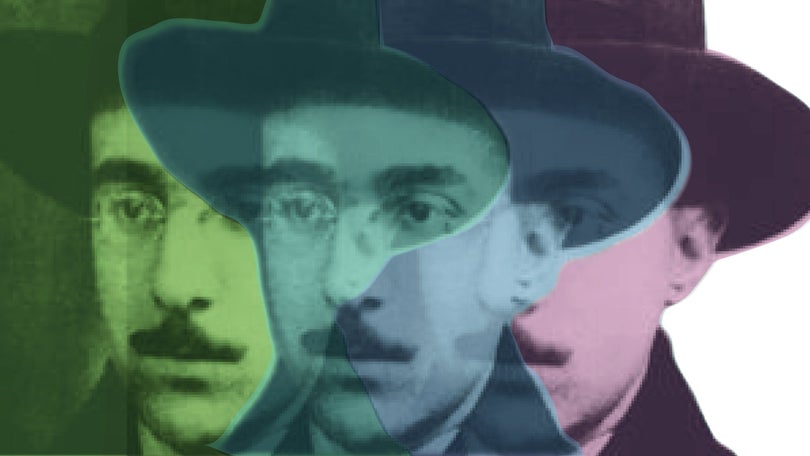The Day Between
It is not reported that he took along
something to read before sleeping
this last night in the hospital, though
he did have access to paper and some-
thing to write with. We know this
because he left behind a one-sentence
note, words that made clear sense to
himself, but were cryptic to everyone
else. Come to think of it, the paper,
the pencil, were his own, resting there,
as ever in the pocket of his everyday
paletot (a Brazilian term won’t hurt
credibility, will it?), close to hand for
setting down a note between assignments
or, perhaps, when drinking at Abel’s.
When did he know that he would not
make it through the night? When did
he realize that he had made a mistake
when casting his own horoscope months
before, and the early death presaged did
not happen, thus increasing his portion.
The error had relaxed him such, that right
off he was able to concoct his myth
describing the rise to consciousness of
his most famous heteronyms—a fabulation
that the sniffing Adolfo swallowed hook,
line, and sinker—as well as poems about
the mediocrity of the politico who shared
his Christian middle name but precious little
else. In any case, his illness had worsened
quickly that afternoon such that in a flash
his doctor (or someone else) had him
whisked away to the French hospital. He
was to be treated by the family’s doctor,
so termed, not only because he treated the
whole family but because he was also a
member of the family. Maybe this doctor
wasn’t the best of doctors (or even a good
one), the poet may have wondered, as his
whole system seemed patently determined
to shut down, wondering, moreover (though
it was too late now), if he should have
placed himself in the hands of one more
competent, more alert to symptoms,
than was this doctor-in-and-of-the-family.
In Durban, the family doctor was felt to be
top-notch—father to Roy Campbell, the
poet, who later claimed to have sat at the
same school desk on which the Portuguese
child had carved his name. All this, in some
hidden way, was part of the back story to
the words the dying poet left behind on that
piece of paper on his hospital bedside stand,
words meant for himself or (as it turned out)
posterity. And, of course, since the next
day was a Sunday, he could rest up (in his
own writer’s fashion) and be back at work
composing commercial letters on Monday.
Better he had fallen ill on a weekday and
missed a day or two of writing those business
letters for those firms that were too busy
getting on, sometimes, to actually get on.
Or was all the subsequent speculation as
to what it all meant wildly misguided and
sadly mistaken? That he, adventurer of the
imaginary that he was, was really looking
forward to a new day with its necessarily
modified living circumstances? The chance
that being a professionally cared-for ordinary
patient would be refreshing? Leisure, a rare
(really absent) commodity in his life, though
it was something his friends and acquaintance,
who knew nothing of the hours and days he
spent writing at the tall chest of drawers in his
room, his door closed, would have recognized
as the lack in his life. In all probability, some
thought that the cruz na porta this time would
refer to his corpse must have crossed his mind as
he lay there, as everything that mattered to him
—light, work, life—closed down around him.
Did he think of the goodbyes that he had failed
to say? Did he trifle away his moments in such
bootless reveries? What, no antithesis to this
thesis? Or was this already the synthesis of
thought that he set down on paper? Would
the newspapers notice? Would the Times,
London or New York? And what, by the way,
was it that was taking him off? Nothing poetic,
like Keats’s consumption, or Chekhov’s, but
cirrhosis, the plain old drinker’s common curse.
And too late now, but he did wish that he’d had
another year, six months, or even just a few
long days (imminence would then have a date)
to revise, to cull and arrange the depressive
Bernardo’s pensées (that’s too grandiose, too
honorific a category, surely, for those jottings,
that marginalia), gathered to justify a catch-all
(loosely unifying) title that just wouldn’t do.
Now, of course, he did feel a modicum of—
confess it—uncharacteristic regret, for all those
now bootless tasks. But then, losing it all would
not be all that bad. Maybe not—though, to be sure,
he hadn’t gotten close to that painter’s grasp, not
even, sadly, his reach. The question, as he now saw
it, was not exactly the one postulated by the Bard’s
poseur, but rather when (if ever) does jealousy
cease once and for all. His jealousy—think now
Ophelia, think Álvaro (no saints there)—only a
silence, reminding us that there is no recording
of his many voices, no way to know what sounds
he made when he spoke, when he sang, if he sang,
or when he cackled back at the galego’s raven.
Nov. 1 / 6, 2013




